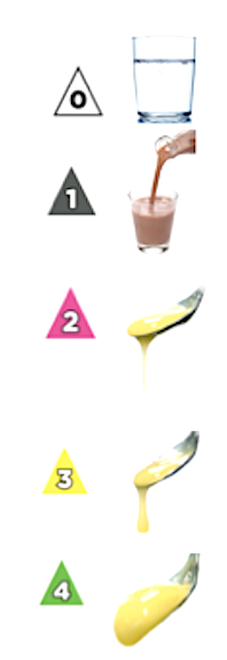|
Why do some people need thickened fluids? If a person has a swallowing problem (dysphagia), they may benefit from drinking thickened fluids. Thick fluids move more slowly down the throat, giving more time to swallow, and make it less likely to ‘go down the wrong way’ into the lungs. Thickened fluids are prescribed by Speech Language Therapists and can be purchased pre-thickened, or can be thickened at home with thickening powder. Thickened liquids come in four thicknesses: slightly, mildly, moderately and extremely thick.  Normal/Thin (Level 0)
Fortisip
Mildly thick (Level 2) - Pouring cream consistency - It runs freely off a spoon, leaving a small coating - Similar consistency to honey or nectar - Can drink from a cup and through a wide straw Moderately thick (level 3) - Smooth yoghurt consistency - Drips slowly in dollops through the prongs of a fork - Can drink from a cup however easier if spooned into the mouth - Difficult to drink through a wide straw Extremely thick (level 4) - Similar consistency to 'instant pudding or dairy food' - Holds its shape on the spoon and falls off in a single spoonful when tilted - Liquid does not dollop or drip continuously through prongs of a fork. Cannot drink from a cup or straw, needs to be spooned into the mouth. It is safest to measure the thickness using the flow test. The flow test measures how thick a liquid is by how much goes through a 10 ml syringe in 10 seconds. A speech language therapist with experience in thickened fluids needs to explain how to do the test. Can fluids be thickened at home? When in a hospital or residential care facility, thickened drinks will be provided. If you are at home, you will need to purchase pre-thickened drinks or use thickening powder to thicken drinks yourself. Pre-thickened drinks Pre thickened drinks come in a variety of flavours and in the three levels of thickness: mildly, moderately and extremely thick. Thickening powders Each product is different and the instructions on the tin should be followed however the resulting thickness is the important thing and the flow test is the best way of knowing the thickness.  Naturally thick fluids There are a number of naturally thick fluids such as:
The flow test needs to be applied to naturally thick fluids to ensure they’re the right level of consistency before drinking. How much fluid should we drink in a day? Adults need to drink an average of 6 to 8 cups (1.5- 2 litres) of fluid a day to prevent dehydration. In hot weather we need more fluids. A dietitian can advise on how much is required. What kinds of fluids need to be thickened? All fluids may need to be thickened depending on the consistency level required including pureed fruits and vegetables, nutritional supplements. What about ice cream? Melt slightly, mix in thickener and re-freeze.  What about jelly? Mix in thickener and refrigerate. Can you thicken fizzy drinks? Yes. First stir the fizzy drink to release the bubbles or “de-carbonate”. Ensure the glass isn’t too full, then slowly add the thickener. There may be some frothing so keep a cloth handy! Can tea and coffee still be made the same way? Yes. When making tea, coffee or hot chocolate, ensure you add the milk before thickening the drink; otherwise milk added later will water down the thickened drink. What about thin soups? You thicken soups in the same way you thicken drinks. Follow the instructions on the tin and adjust to the right level of thickness if needed with additional fluid or thickening powder. Can thickened fluids be frozen? Not all thickeners can be frozen, however drinks made with Easy Thick Advanced Powder can be frozen, as it remains stable when thawed. If you want more information or help with a swallowing problem, Therapy
Professionals Ltd’s friendly Speech Language Therapists can help. Just contact us: Phone: 03 3775280 Email: [email protected] Comments are closed.
|
AuthorShonagh O'Hagan Archives
July 2024
|

 RSS Feed
RSS Feed